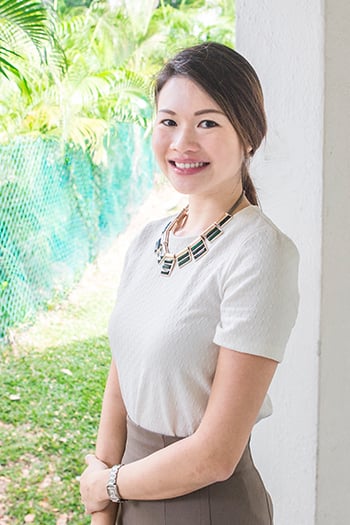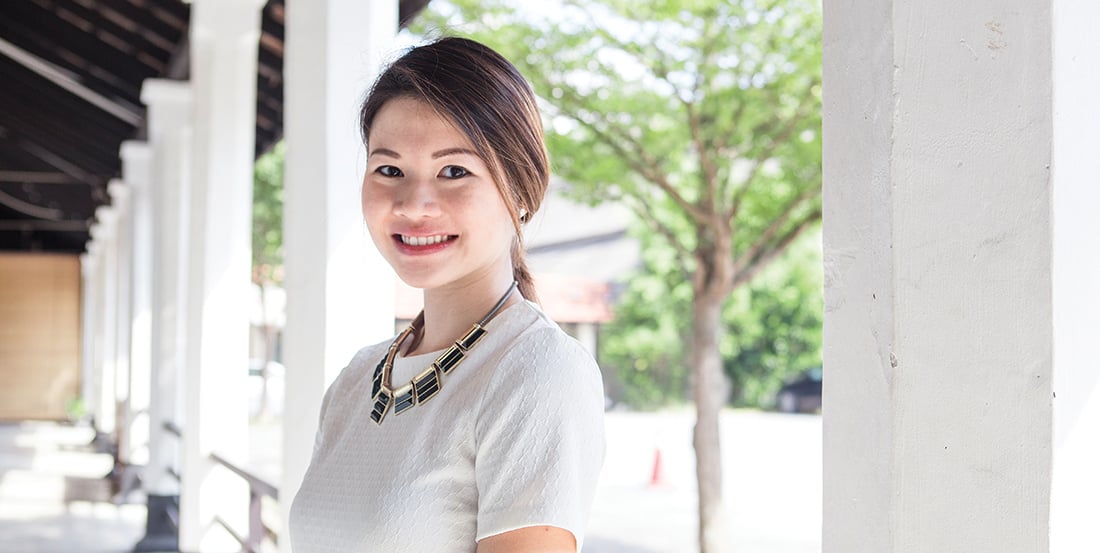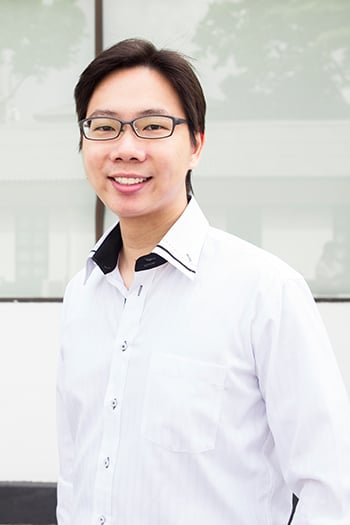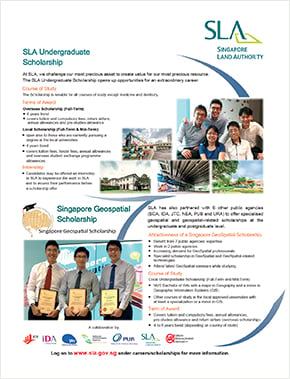As a statutory board under the Ministry of Law,
the Singapore Land Authority (SLA) optimises land
resources for the economic and social development of
Singapore. Two SLA scholars tell us what drew them
to the organisation, and the roles they play in land-use
planning today.
In land-scarce Singapore, there is a crucial
need to develop a strong civic consciousness.
Every use of land needs to be considered
carefully to prevent land wastage, and land
policies have to be reviewed constantly to
encourage and facilitate development.
This is why the Singapore Land Authority
(SLA) dedicates its resources to ensure the best
use of State land and buildings, and regulate an
effective and reliable land management system.
It also leverages on essential land information to
elevate land management standards and in turn
create new business opportunities.
It thus needs a body of competent individuals
who possess a keen sense of social, economic
and environmental awareness to address land
administration issues. Two of these individuals
are SLA scholars, Jaclyn Seow and Gordon
Wong, who are both seconded to the Ministry of
Law’s Land Policy Division. They talk us through
their job responsibilities and regale us with
accounts of their enriching scholarship journey.
What attracted you to your SLA Scholarship?
Jaclyn Seow: Having grown up in land-scarce
Singapore, I was drawn to the prospect of
working with SLA as I’d be able to gain insight into
land policy and its interaction with the country’s
prevailing economic, social, environmental and
civic forces.

Jaclyn Seow Yanmei
SLA Overseas Undergraduate Scholar
Designation:
Senior Assistant Director, Land Policy,
Ministry of Law (on secondment from SLA)
Studied:
Bachelor of Arts in Economics
(Magna Cum Laude) and
Psychology, Cornell University, US
"We are constantly measuring and
weighing trade-offs – between urban renewal
and heritage/conservation, between consistency
and nimbleness in policy formation, and between
the interests of various stakeholders."
I was also keen to begin my career in an
operational role, as being on the ground and
working directly with individuals and businesses
would help me build a depth of experience and
credibility. I knew that this would bolster robust
policy-making at a later stage of my career.
Gordon Wong: I have been interested in maps
and urban development since I was young
(besides mathematics, which I majored in). One
of my favourite childhood games was ‘SimCity’
– what interested me about the game was not
just the land use planning, but how tweaks in
town ordinances, policies and taxes affected the
desirability of my virtual town.
My home also had several hardcopy editions
of the street directory and I used to compare
maps of various new towns to see how they
have changed over the years. Little did I know
that they were published by the former Survey
Department, which became part of SLA in 2001!
Tell us about some of the roles and responsibilities you have fulfilled with SLA.
Jaclyn: I’m currently into my third year of
secondment to the Ministry of Law (SLA’s parent
ministry). Here at the Land Policy Division, I
address issues such as the foreign ownership of
residential property by individuals and developers,
lease extension policies (e.g. for golf courses),
and the injection of vibrancy into State land /
properties. We are constantly measuring and
weighing trade-offs – between urban renewal
and heritage/conservation, between consistency
and nimbleness in policy formation, and between
the interests of various stakeholders.
There is an atmosphere of continuous learning
at SLA that extends far beyond one’s daily work.
I have attended conferences/courses in Seoul
and Quebec, and also organised a geospatial
work trip in 2011 which took me to London and
Ispra. At SLA, I was also Assistant Secretariat to
the Board, which provided me with insights into
how high-level strategic decisions were made. I
have also been given plenty of opportunities to
get involved in projects outside of my immediate
job scope – for instance, I was recently part of an
interdisciplinary, inter-agency team that sought
to define the Government’s strategy for the HDB
retail space.
Gordon: One of my postings was at the
Revenue Tender team, which tenders State
properties for interim use. It was an eye-opening
experience as I got to meet owners and operators
of SMEs very often. Many of them had stories
to tell – about how their businesses began, the
current operating environment and feedback on
the Government’s policies. It made me realise
how important sound practices and fair policies
are to the business community.
I have also attended several conferences – the
one which I learnt the most from was Urban Land
Institute (ULI)'s Asia Pacific Summit held in Beijing
in 2012. A Chinese professor, who was primarily
sharing about Shanghai’s urban development,
mentioned that Singapore’s policies (with regards
to housing, water conservation, greenery within
urbanised areas and application of subsidies) are
things that China can learn from. I was glad that
our Public Service is held in such high regard by
our counterparts in other countries.
Tell us how your undergraduate years were enriching and fuelled your development.
Jaclyn: Cornell University offered a rigorous,
broad-based education, which honed my ability
to think critically and approach any problem
from multiple dimensions. More importantly, the
University espoused autonomous learning under
the guidance of mentors – the College Scholar
programme granted me the freedom to construct
my own major by pulling together courses from
various departments, and I spent most of my
senior year running psychology experiments and
conducting research towards my final thesis.
Having to frequently and independently distill
order from chaos has certainly made me more
confident in dealing with complex problems in
the course of my work.
Gordon: I was fortunate to have had a caring
mentor who kept in contact with me during
my university years and filled me in with the
developments in SLA. I was also invited to SLA’s
various activities, such as the D&D, where I got to
understand SLA better even before I began my
career there.
Gordon Wong Tsz Hong
SLA Local Undergraduate Scholar
Designation:
Assistant Director, Land Policy,
Ministry of Law (on secondment from SLA)
Studied:
Bachelor of Science (Applied Mathematics),
Second-Upper Class Honours,
National University of Singapore
SLA allowed me to pursue my interests as
an undergraduate and encouraged me to gain
multi-disciplinary knowledge in areas such as
economics, geography and sociology. It became
useful later at work as the concept of land is very
broad. For us administrators and policy-makers,
a breadth of knowledge allows us to see things
from different perspectives.
What advice do you have for aspiring SLA Scholars?
Jaclyn: Consider your own fundamental
strengths, weaknesses and passions, and how
these may influence your long-term career plans.
The scholarship you apply for should make
sense in light of those plans. Compare ruthlessly
across various scholarships, including bond-free
scholarships and university grants, to make an
informed a choice as possible.
Also, speak to as many people as possible
from your scholarship provider of choice to get
an idea of what the job really entails and what
the company culture is like. Make your decision
with both eyes open – pursuing a scholarship for
a job you don’t genuinely desire is unproductive
for both you and the organisation.
Gordon: Before scholars make meaningful
contributions, they need some time to
understand current laws and policies, and the
rationale behind them. Patience and diligence
are traits required of every scholar.
It is also important to stay abreast of current
affairs and cultivate the ability to think and argue
from different perspectives. Lastly, always be
prepared to walk the ground and understand
issues first-hand where possible. At SLA, your
experiences will be invaluable.



